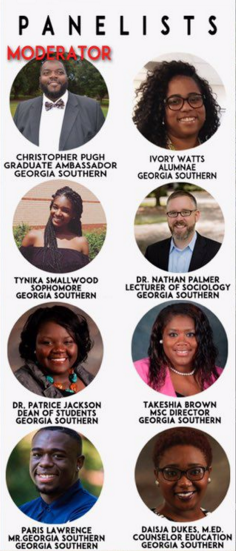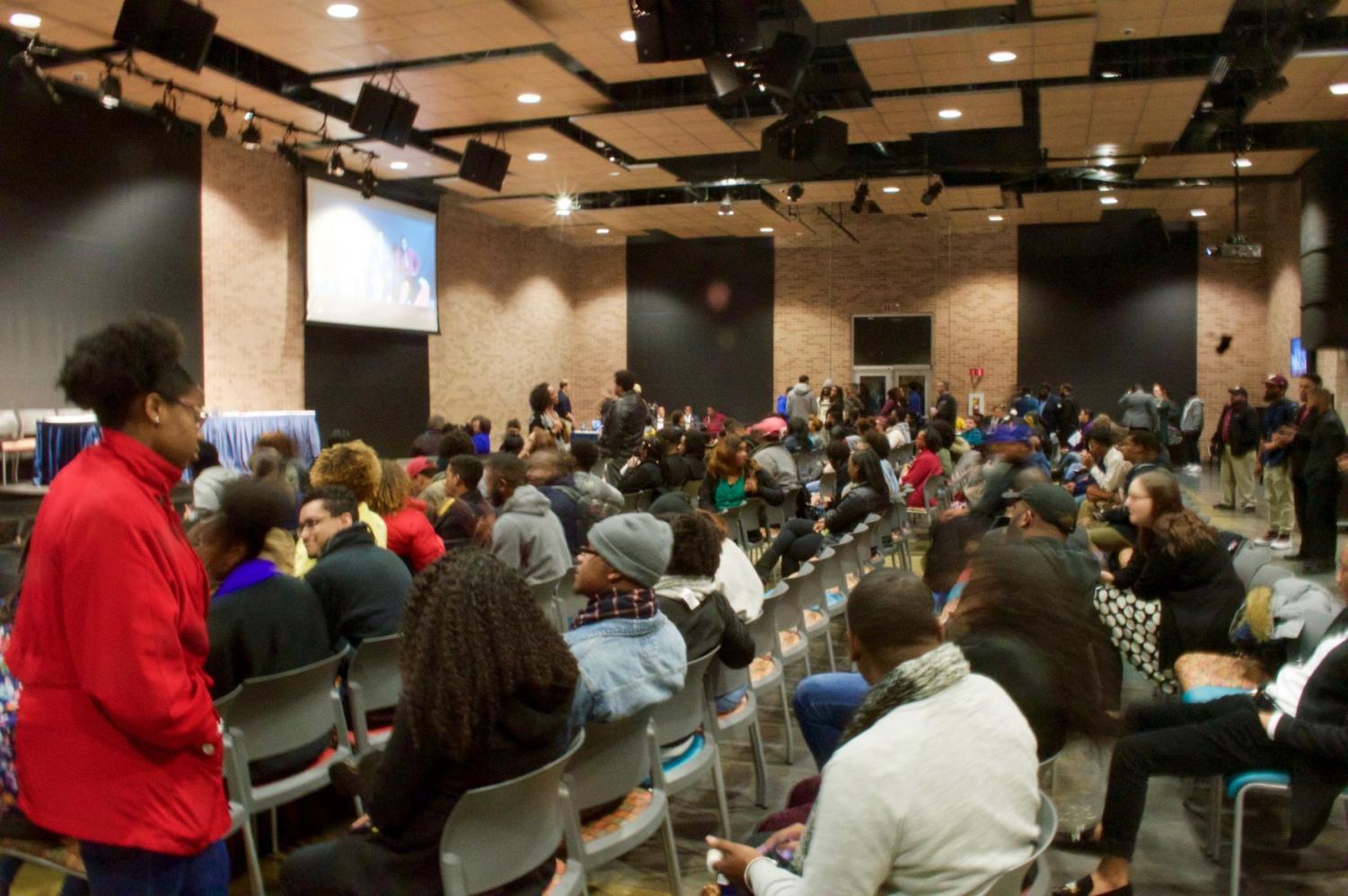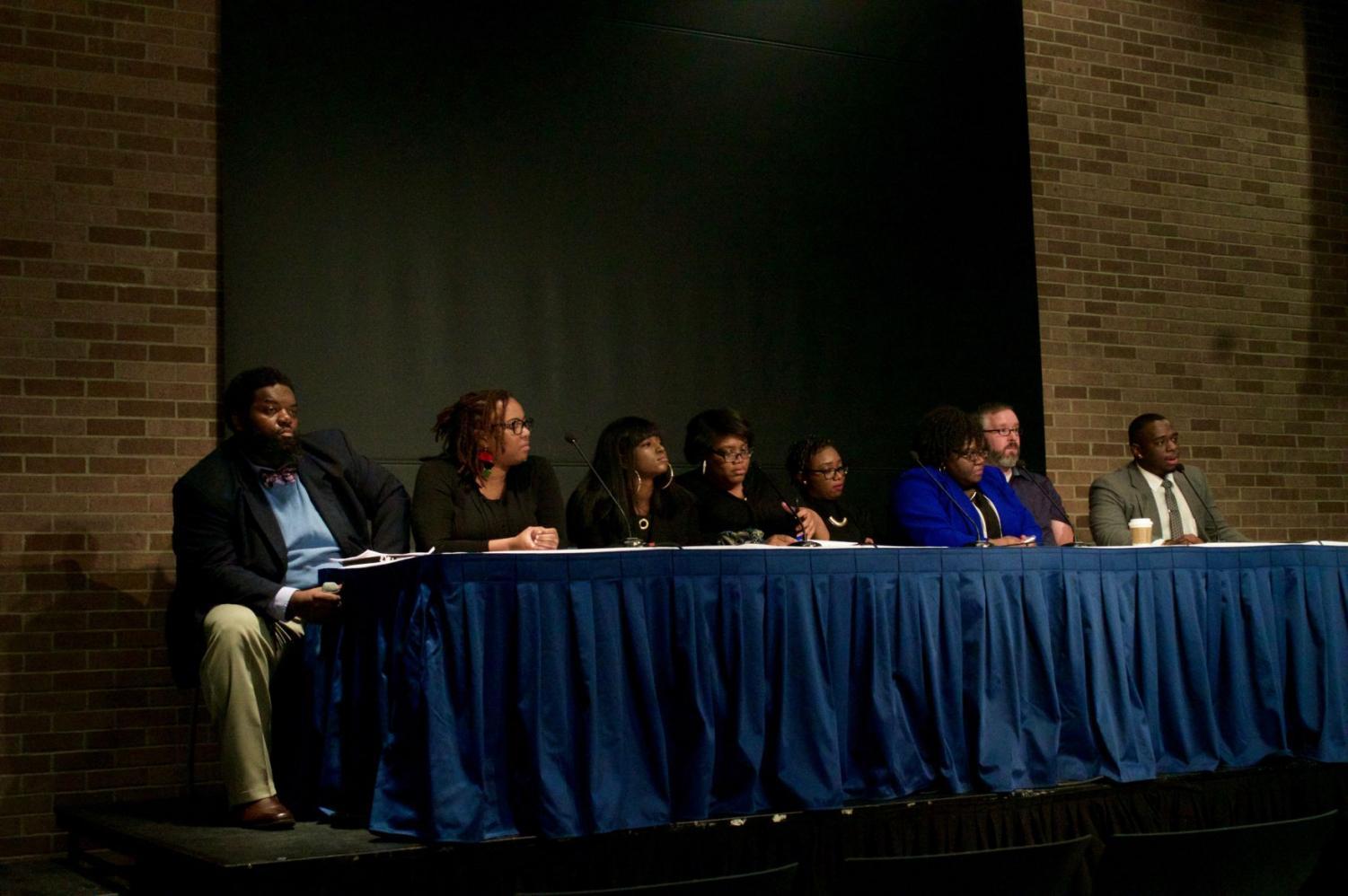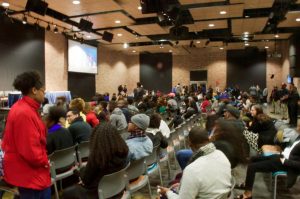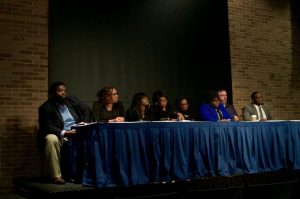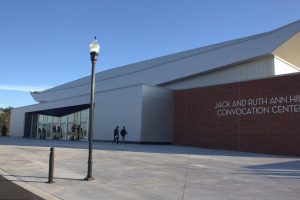First State of Black GSU takes place on campus
January 18, 2018
The GSU Collegiate 100 hosted what was called “the most important event in black GSU history,” in the first State of Black GSU on Jan. 18.
At the event, panelists and audience members discussed the state of black Georgia Southern University students and possible solutions to create a more diverse and welcoming campus.
The conversation, moderated by Christopher Pugh, graduate ambassador at Georgia Southern, followed four main points: “Intellect, Financial, Social and Health.”
In case you missed it, here is a recap of the discussion:
Intellect
The first question of the night asked if panelists Tynika Smallwood, Paris Lawrence, Daisja Dukes and Ivory Watts experienced a difference in their own academic performance when with a same-race teacher.
Smallwood, Lawrence and Dukes all agreed that having a same-race teacher did not make a difference in their own academic performance. All three also said they have not had many black professors during their time at GS. However, Watts said that having a same-race professor did help her academic experience.
“I know for a fact one of the reasons I chose African-American studies as my minor was so I could have professors who looked like me, could understand me, who even after class I knew I could go to them to talk about issues I might have on campus,” Lawrence said.
Lawrence said GS should hire more professors of all nationalities. Lawrence also said that currently, there are no African-American teachers in the History Department at GS.
Nathan Palmer, lecturer of sociology, was asked how he approaches culturally translating the curriculum to students. Palmer said that he tries to create opportunities for his students to communicate with him and relying on his students to help broaden his perspective.
“I just try to shut up and listen and ways I do that is by minuet papers, where my students get to write on something that I need to broaden my perspective on,” Palmer said. “Then, I read what they said and usually I don’t make them put their names on that, so that way I am sort of giving them a vehicle to let me know when I’m not seeing something.”
In a following question, Takeshia Brown, director of the office of multicultural affairs, and Dean Patrice Jackson spoke about the importance of having culture reflected in the curriculum.
“I think we have to figure out the best way to get ourselves represented in the curriculum, how to make it applicable to our situation, but then also how do we figure out what the curriculum means so we can appropriately dissect and analyze and apply the information,” Brown said.
Jackson compared students coming into a new cultural and educational environment to being dropped off in a foreign land.
“Many of our students, African-American students and other minority students, have that experience when they come to higher education, period, but also in the classroom,” Jackson said.
A question regarding the low numbers of black associate professors and assistant professors at GS was asked.
Jackson said that although her position is not in charge of hiring, she has heard the concern from the student body multiple times.
“It’s difficult to recruit to Statesboro when someone has not had a Statesboro experience,” Jackson said. “Recruiting is difficult, but it does not mean it has to be impossible.”
Jackson said that some colleges and universities do intentional recruiting and offer professors opportunities that would attract them to the campus.
Jackson briefly spoke about a new Presidents Diversity Advisement Council at GS that will have Maxine Bryant as the chair of counsel.
In a following question, Brown and Dukes said that GS could improve by creating a welcoming committee for minority faculty and staff.
Financial
The first question in the financial portion asked panelists Lawrence and Brown if their financial experience was different from other GS students.
Lawrence said that, from his experience, minority student financial situations are a little harder than other students.
“I know that, especially when it comes to having jobs on campus, having to work a lot of hours, not having the ability to have a lot of things paid for… a lot of us have to work a lot more in my opinion,” Lawrence said.
Lawrence said that his answer was not to say that there are not any students that are not of color that are not struggling and having the same situation.
Brown said that everyone, including herself, needs to be more wise about their financial decisions.
{{tncms-inline account=”George-Anne News” html=”<blockquote class="twitter-tweet"><p lang="und" dir="ltr"><a href="https://t.co/xk516XzLKr">https://t.co/xk516XzLKr</a></p>&mdash; George-Anne News (@GeorgeAnneNews) <a href="https://twitter.com/GeorgeAnneNews/status/953785527249055750?ref_src=twsrc%5Etfw">January 18, 2018</a></blockquote>” id=”https://twitter.com/GeorgeAnneNews/status/953785527249055750″ type=”twitter”}}
A hypothetical question was asked to panelist Watts and Dukes as to, if they had the appropriate funding, would they offer a scholarship to black GS students or even send their black child to GS.
Both agreed that with appropriate fundings, they would fund a scholarship. However, their answers differed as to whether they would send their black child to GS.
Watts said that GS would be an option for her child, while Dukes said she would not send her black child to GS.
“I don’t think I’m helping my child at all by trying to shield them from the realities of the world,” Watts said.
Jackson was asked if she felt that there were enough scholarships to aid the 26 percent of black students on campus. Jackson said she did not feel that there are enough scholarships that are culturally focused.
“What we need are more donors,” Jackson said. “We cannot say that the money is not available because if enough people got together with $10 a piece, we could buy somebody’s textbooks every semester.”
Jackson said that the audience needed to begin the conversation of donations now and find ways to help after they graduate and are in their career fields.
Social
A question asked the panelists if they have faced any discrimination while being at GS.
“Absolutely,” Lawrence said. “I’ve experienced quite a bit of discrimination on campus, some direct and some indirect.”
Lawrence said some is from being called the N-word to having things thrown at him when people drive by in their trucks, and being an African-American in Greek life.
“A taboo subject is to talk about Greek Row and how black students aren’t really allowed to go down Greek Row or experience that as well,” Lawrence said.
Brown said that it is important to speak about the incidents between those who identify as black and those that do not, but she said that black GS needs to look at how they treat each other.
“Let’s be honest,” Brown said. ” Sometimes, all of us in the room that identify the same, by same, I’m calling out the black folks, we aren’t always nice to each other.”
Brown said she was worried about racial tensions in Georgia, but some of the negative treatment has come from Georgians who identify as black.
“I think if you’re going to be really real about the conversation as it relates to the real black GSU experience, then you have to be critical about the experiences that you are having with other black folks on campus and how you’re treating them,” Brown said. “Until you do that, your movement is false.”
Another question was directed at Jackson regarding a statement that the NAACP released in Fall 2015, which listed demands for the university to pursue. Jackson was asked how these demands can be accomplished on campus through tangible efforts.
Jackson said that students should first work to collaborate before listing demands, adding that they should utilize their voices on campus.
“Attempt at collaboration,” Jackson said. “Attempt at following prescribed procedures. When those procedures do not work or you do not get any response or the response you need, then consider taking a more aggressive approach.”
Jackson also said that students should utilize organizations like the Student Government Association (SGA) and the Dean of Students Office.
“It’s difficult to say that the system isn’t working for me when I haven’t worked the system,” Jackson said. “Make sure there are avenues afforded to you – use those avenues.”
Health
The first question of the Health segment asked Dukes how much mental health factors into the retention of black students. Dukes said that mental health does indeed have an impact on the health of the black community.
“We are a culture that is trying to make up from a history of trauma,” Dukes said.
Dukes said as a culture, the African-American community is healing from trauma that has been passed down, such as not trusting health professionals and seeing health as a weakness.
There is a women of color counseling group, but Dukes said there is no longer a men of color group due to low attendance. Dukes said she would be willing to work with students to revive the group.
Dukes also said that there are no black male therapists in the counseling center.
Palmer said that the faculty and staff of the university can try to do more to make sure there’s a support network available to students.
“We are not counselors or therapists, but often times I find that students just need someone to listen and someone to support them,” Palmer said.
Palmer also said that changing institutions is a “slow” process. He compared successful change on campus to a relay race.
“As a student body, you are at a disadvantage,” Palmer said. “Most of you are here between four and six years, but what we really need is an organization that can carry on the struggle beyond you.”
Legacy
The final question of the night panelists were asked what legacy they would like to leave behind at GS.
Watts said she wants her legacy to be to make the GS community more inclusive and to be part of a group that started change.
Smallwood said she wants to be a person that anyone can come to at anytime.
“I would like my legacy to be really just a walking testament that you can redefine your future,” Lawrence said.
Jackson said she wasn’t sure if she was looking to leave a legacy, but her purpose is to open doors for as many people as possible.
Dukes said, “I’m looking to build, to empower student leaders who are culturally competent, socially adjust, aware of their processes and are equipped to dismantle the system and challenge structural institutionalism as a means of providing access and opportunities for all people.”


